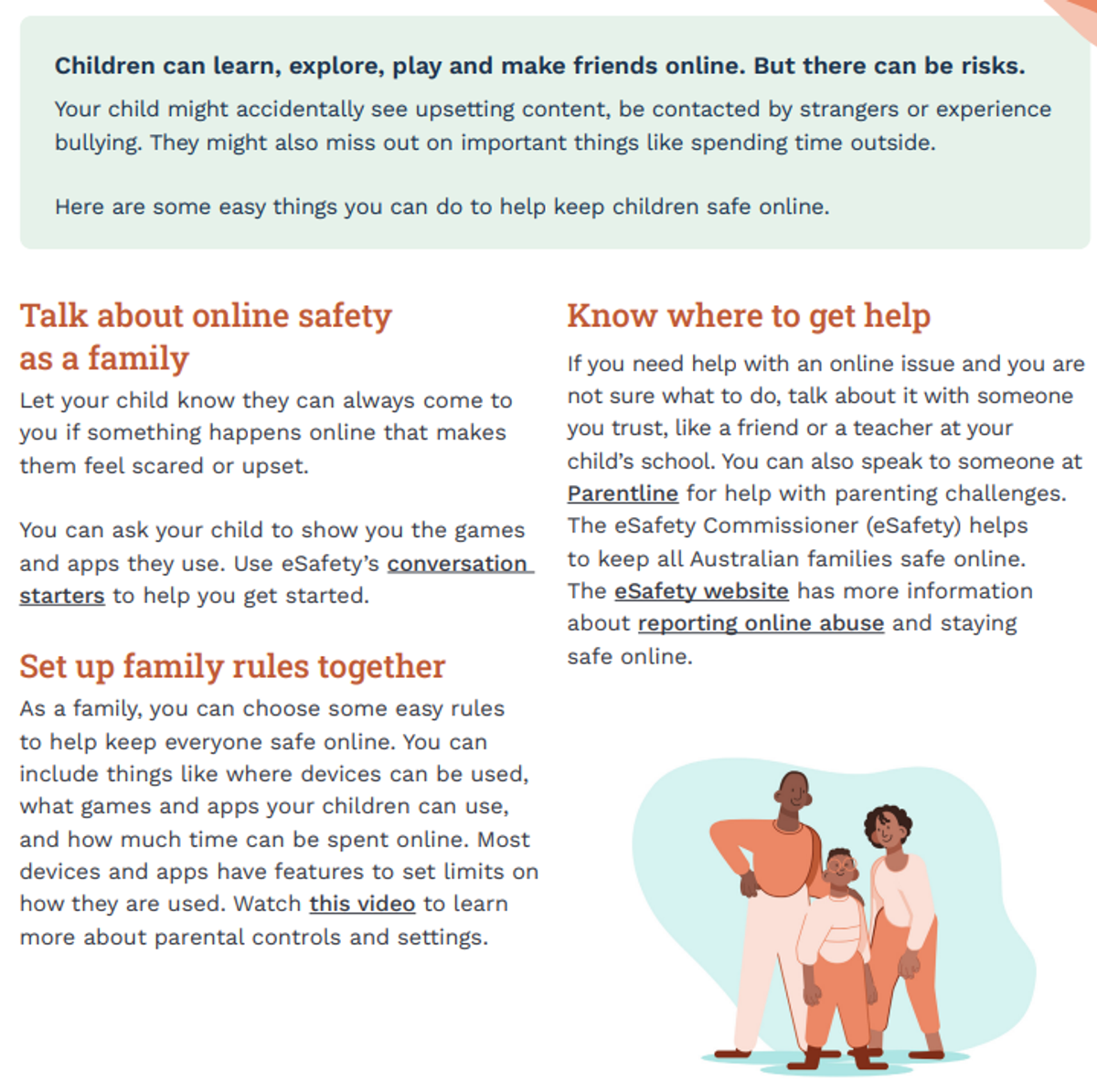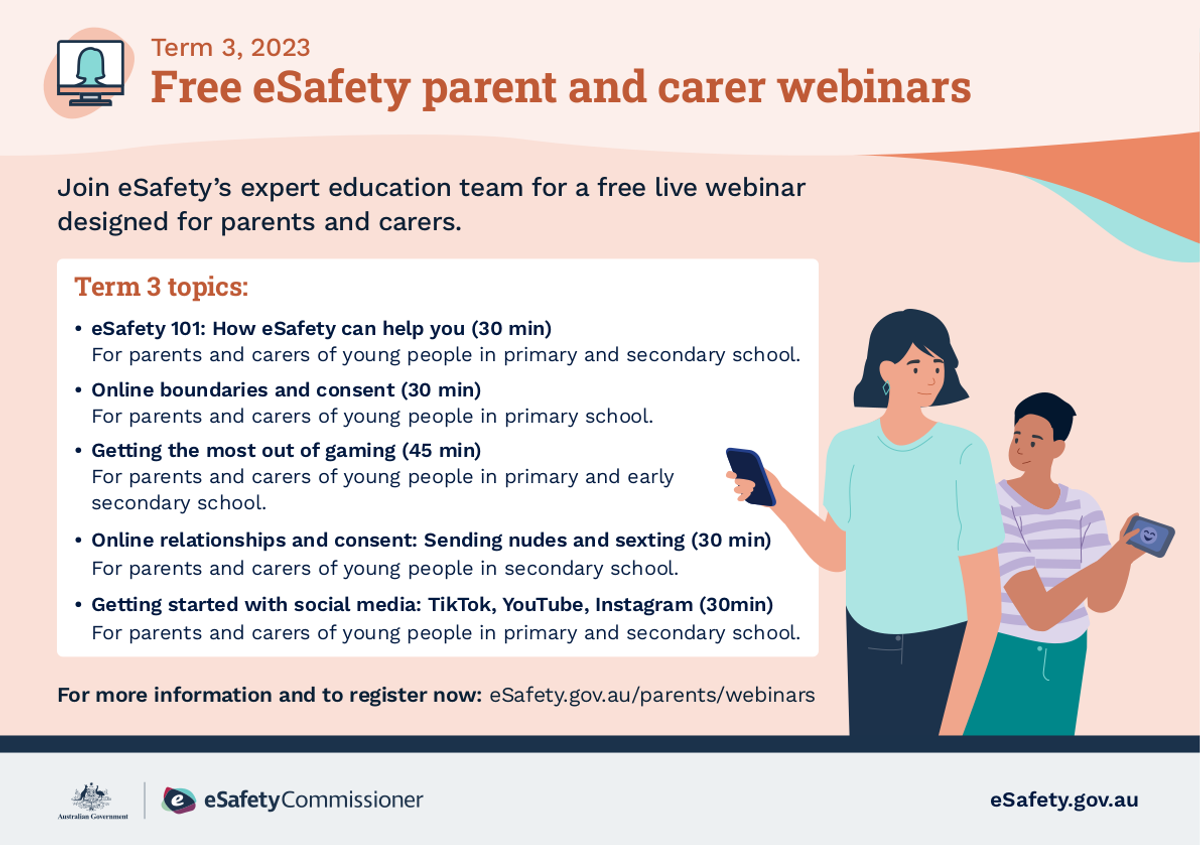Wellbeing
@ LPS

Wellbeing
@ LPS
On Friday we will be having our performance for Years 1-6 on being assertive, responsible and safe online. The production, Zana and the Lost Code, is endorsed by the eSafety Commissioner and one of the main aims is to get the conversation started with our students. Make sure you ask your child all about this experience, it may help you get the conversation started at home around online safety!


This terms free eSafety webinars are outlined below and further dates and details can be found by visiting the website.


This week I had the opportunity to listen to Susan McLean present a Cyber Session. Susan is Australia’s foremost expert in the area of cyber safety and was a member of Victoria Police for 27 years. Widely known as the ‘cyber cop’ she was the first Victoria Police Officer appointed to a position involving cyber safety and young people.
I wanted to share some of her top tips for keeping safe online and to think about in connection with our children.
"Parents are the gatekeepers to their child’s online world. They need to be there with them. They need to know what they’re doing and who they’re doing it with. This can be a daunting task for parents, especially those who did not grow up with access to the same digital technology that their children have.
Many parents fall into the trap of thinking that their kids know it all. And whilst young people are tech savvy in that they can use the devices and use them well, what they don’t have is cognitive and brain development aligned to that skill. So we know that there is a massive gap between what young children can do online and what they have the capacity to understand."
Top Tips
Number 1- Get devices out of bedrooms and bathrooms. No matter how good a parent you are, you can’t supervise in a bedroom and a bathroom.
Number 2- Have a set of rules, you have rules about acceptable behavior in real life. Make sure those rules extend online. So an online family contract about expectations of use is important.
Number 3- Know your children’s passcodes and passwords. That is not invading their privacy, that’s being a parent. Make sure that you can, if necessary, get into their accounts if something has gone wrong.
Number 4- Talk early. Talk often. The earlier you start, the better. But it is never too late to start. Let your children know that no matter what, they can come to you.
Number 5- Use some sort of filtering. Please understand the Internet is a very adult world. It does not come segmented into age appropriate areas, so you need some sort of filtering to help make sure that your children are not exposed to inappropriate, explicit or illegal content.
Number 6- Learn about the apps that they use, be there with them, download them, look at them, play with them. Have an appreciation of what the app is, what it does, and how to best protect your children when they use those apps.
Number 7- Use security and privacy settings. Some apps have really good privacy and security, some not so. But if you’re not using them, it’s like the bike helmet. If it’s not on your head when you fall off, it’s not going to protect you.
Number 8- Make sure that you limit their online communications to people they know and trust in real life. This isn’t going to remove risk, but it’s going to reduce risk. And that’s all we can hope to do. You cannot remove risk if a child is going online. So what we have to do is identify the risk, minimize and manage it. So unless you know them in real life, really know them, not a friend of a friend. They shouldn’t be hanging out with them online.
Number 9- Know where your child is online, just as the same as you would in the real world. Know where they’re going, know what they’re doing and make sure you regularly check in with them. Being an active and involved participant in your child’s online world is the best protective factor that they have.
Number 10- Learn to say no. It’s a very important word, and it’s one, sadly, that a lot of parents don’t use. They’re too worried about upsetting their child or having their child not like them. It’s not your job to be liked by your children. Your children will love and respect you for saying, no.
Susan's book- 'Sexts, Texts and Selfies' is filled with case studies, scenarios, lots of talking points that you can use to have these and more discussions with your children, and there’s also a sample online family safety contract- if you'd like to read more.